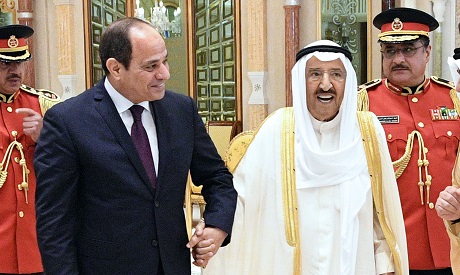
A photo provided by the Kuwaiti news agency KUNA on September 1, 2019 shows Kuwait's Emir Sheikh Sabah al-Ahmad al-Jaber al-Sabah (R) receiving Egyptian President Abdel Fattah al-Sisi in Kuwait City. (Photo by - / KUNA / AFP)
Egypt and Kuwait said this week they have reached a new agreement to reinforce security cooperation.
Following the two-day visit by President Abdel-Fattah Al-Sisi to Kuwait which began on Sunday a press release was issued saying “the cooperation agreement is aimed at combating terrorist forces which seek to sow sedition and chaos in countries across the region.”
The agreement comes two months after the Kuwaiti government handed what it called “a terrorist cell” — eight Egyptians linked to the Muslim Brotherhood — to the Egyptian authorities.
Political analysts and security experts say the new security agreement reached with Kuwait will significantly raise levels of cooperation.
Kamal Amer, head of parliament’s Defence and National Security Committee, revealed the agreement involves the exchange of information on the regional movements of terrorist groups and a strengthening of contacts between Kuwait and Egypt’s security apparatuses. According to Amer, when President Al-Sisi said during the visit that Egypt’s national security is inseparable from that of Kuwait and other Arab Gulf countries, he was underlining the cross-regional threat terrorist groups pose.
Egypt’s Prosecutor-General Nabil Sadek said on Monday that the new agreement will also see Egypt and Kuwait extradite suspects in cyber-related activities deemed a threat to either state’s national security.
“Perpetrators of cybercrimes that undermine Egyptian national security or aim to harm the economy… and who reside in Kuwait will be handed over to Egypt, and vice versa, under the new agreement,” Sadek told Egypt’s state news agency MENA.
“Criminal activity is increasingly complex and cross-border and no country can confront it alone,” said Sadek.
The agreement, signed by Egypt and Kuwait’s most senior prosecutors during President Al-Sisi’s visit on Sunday, is expected to speed up legal proceedings.
Sadek said the deal will boost judicial cooperation across all forms of crime, facilitate the exchange of information and expedite the handing over of suspects.
The eight Egyptians Kuwait handed to Egypt in July were members of a “terrorist cell” with ties to the outlawed Muslim Brotherhood, Sadek said. The militants, who the Kuwaiti interior ministry said had admitted to carrying out terrorist operations in their home country, were handed over to Egypt under existing security agreements now supplanted by the new agreement.
“This close cooperation shows that Kuwait has become a hostile ground for the Muslim Brotherhood,” says Amer. “Kuwait may not yet have officially designated the Muslim Brotherhood as a terrorist group but recent moves show it is quickly moving in this direction.”
Security expert Khaled Okasha said in a TV interview on Monday that it is clear that Egypt’s leadership is moving against Muslim Brotherhood on multiple fronts.
According to Okasha, “not only is the government refusing to give credence to the reconciliation initiatives proposed by some Muslim Brotherhood elements, it is clamping down on the group outside the country.”
Young Muslim Brothers serving long jail terms in Egypt recently demanded the group’s leaders who are living in Turkey and the UK should either reach a deal with Egypt to secure their release or else resign. They have also accused the group’s Istanbul and London-based leaders of embezzling millions of dollars in funds.
The Brotherhood’s internal rifts deepened when the group’s leaders rejected the reconciliation proposed by its younger members out of hand. Indeed, one senior Brotherhood cleric, Sheikh Mohamed Abdel-Maqsoud, was shown in a video on MBC channel on Monday directing insults at the group’s young detainees.
Nageh Ibrahim, a former Muslim Brother, says opposition to any form of reconciliation with the Muslim Brotherhood comes not only from the ruling regime in Egypt but from “a wide sector of the public who lived through the chaos that accompanied the group’s year in power.
“Journalists, lawyers, judges, intellectuals, Copts et al see any Brotherhood comeback as a nightmare.
“Islamist groups themselves regard the Al-Sisi regime as a military one, no different from those of Nasser, Sadat and Mubarak, making it impossible to envisage any kind of reconciliation,” said Ibrahim.
“Brotherhood leaders are still banking on the collapse of the Al-Sisi regime and believe they will return to power,” says political analyst Ahmed Al-Shorbagi. “And the aggressive behaviour of Brotherhood leaders living in Turkey, Qatar and Europe makes it impossible for the Egyptian leadership to respond to any reconciliation overtures.”
*A version of this article appears in print in the 5 September, 2019 edition of Al-Ahram Weekly under the title: Reconciliation: Pie in the sky
Short link: